
2023 Red Balloon League Members
Meet our 2023 Red Balloon League, a collection of employees, patients, families and supporters of Children's Health, unifying to make the impossible possible.
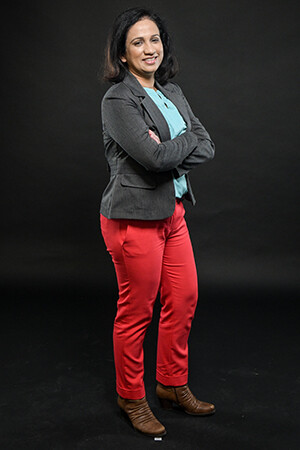
TEAM MEMBERS: JULIE MIRPURI, MD, Physician Scientist
SUPERPOWER: Improving care for sick newborns
As a neonatologist, Julie Mirpuri, MD, takes care of preterm and very sick babies in the Neonatal Intensive Care Unit (NICU) at Children’s Health℠.
“I love this job. Most of the fragile little babies we care for grow stronger, get well and go home with their families,” said Dr. Mirpuri, who is also an Associate Professor at UT Southwestern Medical Center.
But too many babies in the NICU – especially those born three or more months before their due date – experience a serious complication called necrotizing enterocolitis. This disease causes tissue in the intestine to become inflamed and die. Sometimes holes develop in the intestine allowing bacteria to pass into a baby’s bloodstream, which can cause life-threatening infections.
Determined to find better ways to prevent and treat this deadly condition, Dr. Mirpuri puts on her researcher hat to understand what is happening in a baby’s gut that allows necrotizing enterocolitis to flourish.
“In the past, it was thought that all bacteria were bad and that wiping it out with antibiotics could restore health. Today we know that our bodies house a complex ecosystem that has good bacteria, bad bacteria and other organisms that contribute to robust good health or illness,” she said.
Dr. Mirpuri is currently studying the role nutrition plays in developing a baby’s immune system and intestine as she works to maximize their ability to grow stronger, avoid infection and go home faster.
She’s excited about her team’s recent identification of some dietary metabolites that they think could prime the development of a newborn’s immune system. Metabolites are substances made or used by the body when it breaks down food, drugs, chemicals, and even fat and muscle. She and her team are working on ways to combine these metabolites and then test them in animal models. They are aiming to have a new therapy for babies in 10 years or so.
“Research is the key to improving the health of children, but the road can be long and there are a lot of mile markers to pass along the way,” Dr. Mirpuri said. “Funding is essential to making research possible but getting it can be challenging – especially for investigators who are early in their careers or who are looking at unique ideas.”
That’s where donors – like members of the Red Balloon League – can make a game-changing difference. Gifts from individuals and organizations across Texas fuel research in important ways – like financing early, proof-of-concept studies that help researchers gain new knowledge that allows them to apply for more traditional funding opportunities.
In 2021, more than 200 active clinical research trials were sustained and grown because of donors. These trials are helping improve the prevention, diagnosis and treatment of childhood diseases. Philanthropic investments in research are vital to offering the best treatment options for patients like Dr. Mirpuri’s.
“I take care of sick babies at the beginning of their lives, and it’s becoming clearer and clearer that how we care for them early on affects the trajectory of their entire life. Research is the key to finding ways to make sure fragile babies get on the right track,” Dr. Mirpuri said. “At Children’s Health, we can see a need in the hospital, go to the lab to better understand it, and then bring possible solutions back to patients. It really is a perfect environment for ground-breaking research.”
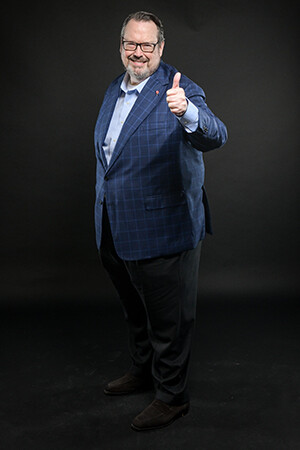
TEAM MEMBER: CHUCK LATHEM, Donor
SUPERPOWER: Empathetic concern about others
Chuck Lathem’s introduction to Children’s Health℠ was as dramatic as it was abrupt: His newborn son was rushed to the hospital shortly after birth when doctors realized he had a serious, undiagnosed heart defect called transposition of the great arteries. The two main vessels carrying blood out of his little heart were switched so it was pumping oxygen-depleted blood back to his body instead of to his lungs where it could be replenished.
“It was a lot to take in,” recalled Chuck. “I was commuting back and forth between a hospital where my wife, Louise, was recovering from a Cesarean birth to Children’s Health, where the care team was preparing our newborn son for surgery.”
Thankfully, a single surgery – at 4-days old – fixed Wilson’s heart and the Lathems didn’t find themselves at the hospital too often throughout the rest of his childhood. But that initial experience opened their eyes to the incredible resource they had right in their own backyard.
“Living in the DFW metroplex, I may have taken Children’s Health for granted,” Chuck said. “But once I was in the hospital, I realized what we had here and was so grateful. Other families had to travel from all over to get the care their children needed.”
The Lathems became faithful supporters of Children’s Health almost immediately – and Chuck continues to carry on the tradition since Louise passed away from cervical cancer in 2011. A consistent annual donor for more than two decades, he also has made several legacy gifts. In 2022, he established a matching gift to encourage others to make recurring monthly donations to Children’s Health.
But the thing he is most interested in these days is research and its power to improve the health of children everywhere.
“Research lets us look to the future. It’s the key to finding effective ways to treat children who don't have good options today. Donors help make that possible,” he said.
Chuck recently created a major endowment to fuel pediatric-focused research at the Children’s Research Institute at UT Southwestern – a joint biomedical research powerhouse established between Children’s Health and UTSW to lead innovative discoveries in the areas of regenerative medicine, metabolism and cancer.
“I’ve been very fortunate in my life for the most part. My goal is to give back and make the world a little better than when I entered. There are many wonderful organizations out there but I think taking care of our children is the most important thing – whether it’s my child, your child or somebody else’s child,” he said. “Supporting Children’s Health is a tangible way to make life better for kids. Everyone’s gift makes a difference.”
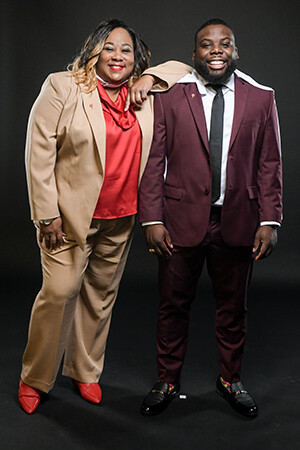
VOLUNTEER: KELTON JEFFERY and CHANTEL WILLIAMS, J.E.D.I.
SUPERPOWER: Leading with patience and collaboration to make life better for children
Nothing could have prepared Kelton Jeffery for working on the pain and palliative care team.
“Everything that team does begins and ends with empathy," Kelton said. “Some of the kids who come to the pain clinic are so sick they can’t go to school or have the lights on for more than a few minutes. Other patients in Palliative Care won’t even live to become teenagers.”
He joined the pain and palliative care team in 2020 as the practice administrator dedicated solely to serving patients who came to the Plano campus. In this role, Kelton helped facilitate the efforts of nurses, physical therapists and doctors to ensure every patient’s needs were met and their medical status was up-to-date.
In 2023, Kelton became the Director of Surgical Programs at Children’s Health℠ Plano, leading a hospital-wide effort to make more surgeries and complex surgeries available to families closer to Plano.
“The best part about working at Children’s is that no matter what your job is, you’re playing a part in fulfilling our mission to make life better for children. What we’re doing at our Plano campus will allow more kids can get all of their care in one place,” Kelton said.
Kelton is also chair of the Children’s Health, Equity, Diversity and Inclusion Commission (HEDIC) team, which identifies ways to make the hospital a more equitable place for patient families and team members. Leading a volunteer group with more than 700 employees is a big job for a position that isn’t officially part of Kelton’s job.
Kelton explains that the goal of HEDIC is to ensure Children’s Health becomes a place where unconscious bias doesn’t exist and no patient family or team member feels like they are less than another.
Last year, Kelton and his team members on HEDIC joined forces with other employee work groups focused on diversity, equity and inclusion to form a “super” fundraising team for the Red Balloon League campaign, a time when employees can fundraise for an area of the system that is meaningful to them.
Together, employee groups combined forces under the team name J.E.D.I. (Justice, Equity, Diversity and Inclusion) and raised more than $3,000 for DE&I initiatives at Children’s Health.
For the 2023 Red Balloon League fundraiser, Kelton, who is co-captain again for J.E.D.I., has challenged the team to double their results.
“Our team looks at every part of Children’s Health and asks where can we be better for families and our team members?” Kelton said. “Being our community’s expert in kid's health, our mission goes way beyond our walls as we all work together to make life better for children.”
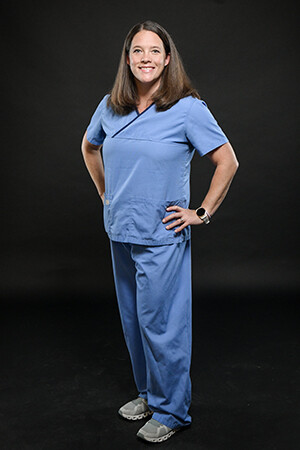
TEAM MEMBER: RACHEL HAARDE, RN in the Pauline Allen Gill Center for Cancer and Blood Disorders
SUPERPOWER: Tenacious Teamwork – The best recipe for patient-centered care
When Rachel Haarde tells people she's an oncology nurse, she emphasizes how much fun she has at work.
“I laugh all the time. Right now, I have a kid who rides a scooter through the hallway with her chemo bag attached to her super pole, racing her nurses, racing her child life specialist,” she said.
Rachel, who is part of the outpatient oncology team in the Pauline Allen Gill Center for Cancer and Blood Disorders at Children’s Health, has spent the last decade caring for kids with brain and spinal cord tumors. During that time, she’s worked alongside a team of nurses who champion a team effort for kids to continue being kids – even in the hospital.
“The most rewarding part of my job is being there with patients and families as they navigate their diagnosis and treatment,” Rachel said. “As nurses, we’re with them from when they get the news that their kiddo is sick and throughout their cancer experience. It’s comforting to families to know they have a team of people who have been there before, know what to do and are there to support them.”
There are many emotional moments in between the laughs, and Rachel makes sure every patient knows the team is as ready to give a hug and grab a tissue as they are for games and coloring.
“We are honored to take care of these kids and their families. They place their trust in us to walk alongside them through their toughest journey and we don't take that lightly,” Rachel said.
And while pediatric cancer is a challenging diagnosis, Rachel remains hopeful for her patients. For the last decade, she’s had a front-row seat to the strides clinical research has made in improving outcomes and minimizing the side effects of cancer therapies.
"Thanks to research, we are able to treat some cancers today that we didn't have good options for when I started," she said. "Research is helping solve the puzzle of how to beat brain cancer while protecting a child's developing brain."
These discoveries wouldn’t be possible without donor support. In 2021, more than 200 active clinical research trials were sustained and grown because of donors, helping improve the understanding, prevention, diagnosis and treatment of childhood diseases. Philanthropic investments in research remain critical to continue offering the best treatment options for patients like Rachel’s.
Looking forward, Rachel hopes advances in research will continue to improve patient outcomes as philanthropy empowers physicians to better understand pediatric diseases to treat and cure children.
“Better, more effective treatments mean our team receives more graduation announcements and holiday cards," she said. “Those milestones and celebrations are our team’s greatest achievements.”
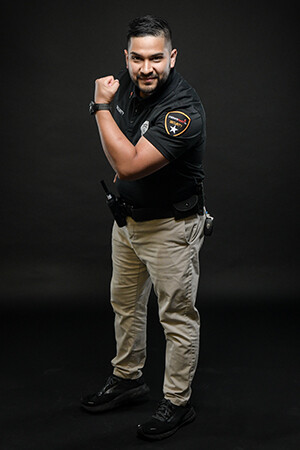
TEAM MEMBER: ADRIAN HERNANDEZ DE VELASQUEZ, Field Training Officer at Children’s Medical Center Dallas
SUPERPOWER: Patience. Adrian hears with his heart
Children's Health is open 24 hours a day, 365 days a year. People enter and leave our facilities at every hour of the day and night and Children’s Health Security Officers are the people tasked with keeping them safe.
“A lot of times we get called to help when there is a stressful situation and emotions are running high, be it an emergency situation with a patient or family member or dealing with external situations happening on the perimeter of the hospital,” Adrian said. “Our job is to bring safety, security, and peace of mind to anyone who enters the building including staff members, patients, and visitors that come to see loved ones.”
This means being masters at quickly earning people’s trust. Adrian emphasizes that everything his team does begins and ends with active listening and tons of patience.
Having patience is one of the skills that Adrian has mastered in his first job at Children’s Health as a Patient Care Technician in the Neonatal Intensive Care Unit (NICU). For two years, Adrian supported nurses, doctors, and parents with anything that was needed to care for the hospital’s smallest and often most fragile patients.
“The babies are really delicate. Giving them an eye exam or putting in an IV takes a lot of patience,” he said. “Working in the NICU built my confidence and made me comfortable staying calm and talking to people when the stakes are high.”
Last year, his skills in patience and listening earned Adrian a role as a Field Training Officer for new Security Officers. With each new recruit, Adrian prioritizes teaching the importance of making the hospital a comfortable place for everyone who visits. He helps his new team members find their own confidence in making eye contact and speaking softly, especially when children are around.
Being a member of the Security Department also means that Adrian is a key part of the Behavioral Emergency Response Team (BERT), a group of people from across the hospital who specialize in de-escalating tense situations. This is especially important when the BERT team responds to a call where a child or teen is experiencing a mental health crisis.
“Resolutions don’t happen in two seconds. But a lot can be accomplished with time and listening. The first thing I try to do when someone’s upset is make them feel comfortable, so they’ll tell me what’s wrong,” he said. “That means whoever is struggling needs to know we are on their team and that we care about what they want.”
Being a dad also has helped Adrian empathize with the emotional situations parents and children face at the hospital. It has helped him a clearer perspective on the complicated things kids face. And he’s glad to be part of a team that prioritizes our youth’s mental health. More than anything, Adrian and the Security Department want kids and families to feel like Children’s Health is the safest place for them to be no matter what they need.
“I love it when we can turn a difficult situation into something really positive,” he said. “I feel like modeling healthy communication and helping a kid have a good experience with us is one of the ways we can make life better for children.”
DONOR: CHLOE POPOVICH, Child Life Specialist
SUPERPOWER: Supporting patients and families through challenging times
The desire to help children and their families navigate illness inspired Chloe Popovich to enter the medical field. She supports families through some of life’s most challenging moments as a certified child life specialist in the Pauline Allen Gill Center for Cancer and Blood Disorders at Children’s Health.
“Every patient and family who comes through our doors is facing hardship,” Chloe said. “They are receiving tough news, facing a frightening procedure or receiving treatment that is difficult to tolerate. My job is to help them understand what is happening and feel more comfortable in the hospital.”
That means explaining a diagnosis or treatment, preparing a patient for a procedure, empowering the family to talk with their care team, or helping solve practical issues like how to swallow pills. Every day is different because each patient and family is different -- and because everyone’s cancer journey is unique.
“The variety keeps me sharp,” she said with a laugh, noting that child life specialists pull from their expertise in childhood development to meet patients where they are. “I’m always thinking about how best to work with each patient in ways that are both age-appropriate and individualized. The way I describe cancer to a toddler is a lot different than how I talk to a teen about it, and the amount of detail I share depends on how receptive they are.”
Programs like child life -- which provide coping strategies and help make life easier for those experiencing the unthinkable -- are offered throughout the hospital at no cost to our patient families. And they are one of the resources that makes the holistic care we provide patients and families at Children’s Health unique. Philanthropic gifts will continue to be essential in affording team members like Chloe and other child life specialists the ability to meet the individual and wide-ranging needs of families we serve.
Chloe and her team members, for example, sometimes demonstrate a medical procedure on a stuffed bear so a child knows what to expect. Other times, they use two books (one for patients, the other for siblings) that they created as teaching tools in the oncology clinic to give an overview of what cancer is, how it affects the cells in the body and the different treatments and interventions used to fight it.
Kids with cancer go through a lot. Medications can make them feel sick and affect their appearance. The disruptions to their normal routine can leave them feeling isolated and out-of-touch with their peers.
“Being in the hospital is hard,” Chloe said. “I want families to know that we’re going to do everything we can to make it as comfortable as possible. We’re going to work really hard to provide the best care and service. We’re going to respect their input because they know their child best. No matter what their role, everyone at Children’s Health has the same goal: We want to make life better for children.”
Kids count on us. We count on you.
Give to support innovative research, lifesaving treatments and compassionate care.
Did you enjoy this story?
If you would like to receive an email when new stories like this one are posted to our website, please complete the form below. We won't share your information, and you can unsubscribe any time.

